DISCOVER OUR SIX ANIMAL STARS – BUT WHICH ONES & WHY?!

MEET CHRIS PACKHAM: WILDLIFE WARRIOR, LIVING LEGEND
YOUR GIFT COULD BRING COMFORT & JOY THIS CHRISTMAS

DISCOVER OUR SIX ANIMAL STARS – BUT WHICH ONES & WHY?!

MEET CHRIS PACKHAM: WILDLIFE WARRIOR, LIVING LEGEND
YOUR GIFT COULD BRING COMFORT & JOY THIS CHRISTMAS
Dear Friends,
Following hard on the heels of the launch of our Pathways to Freedom five-year plan (bornfree.org.uk/pathways), this fresh and enticing edition of Wild Life wings its way to you featuring our six hero groups of animals – big cats, elephants, primates (not least great apes), rhino, giraffe, and pangolins.
Of course, we won’t forget all the other individual wild animals and species who need our help, but this is where we’ll focus our greatest efforts. And, on top of that, we have identified six key areas where we’ll strive to apply ourselves to even greater effect – our homeland of Kenya, as well as Ethiopia, Cameroon, South Africa, India, plus here in the UK and Europe. We’re nothing if not ambitious!
This issue is packed with examples of how, thanks to your support, Born Free is delivering maximum impact. Whether for individual animals, or a species as a whole, for communities living alongside wildlife, or in the realm of ‘policy-making’ (better legal protections = better outcomes for nature!).
You’ll be fascinated by my Mum, Virginia, speaking to amazing Dr Johan Joubert, Shamwari’s wonderful vet who, unbelievably, is retiring (although I suspect wild animal care will always be on his agenda). Meanwhile, nature champion, Chris Packham CBE, shares some of his thoughts in these challenging times.
Christmas is the season for giving, and while there are many causes that compete for our attention, it is wonderful to know that wild animals – their care and compassionate conservation – lies close to your heart. So, do look out and please dig deep for our vital Comfort & Joy appeal.
Please share this magazine, share your compassion, and let’s make this a Christmas to remember!
As ever,

Will Travers OBE Executive President will@bornfree.org.uk
@willtravers

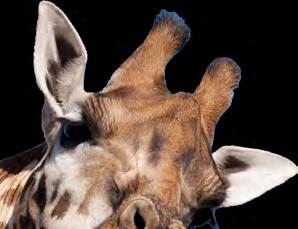


bring
Celebrate the season of goodwill by transforming a rescued animal’s life. From a tiger to a pangolin, you could provide life-changing ‘enrichment’, tailored for each species. From puzzle feeders to climbing frames, you could help traumatised animals recover, encourage natural behaviours and promote well-being. See page 18 and donate today at bornfree.org.uk/ comfortandjoy

Take Wild Life everywhere you go! Perfect for any device, our online digital mag is no print, no post, low carbon, low cost and max help for wild animals. To go green: email info@bornfree.org.uk or call 01403 240170
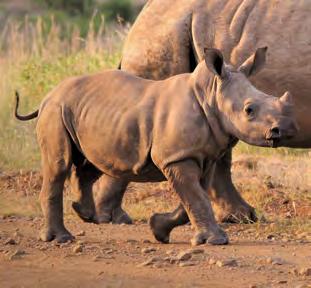
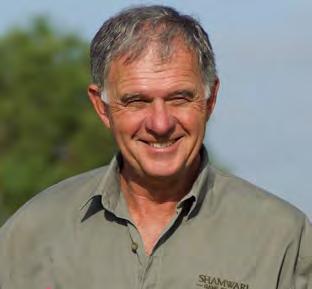

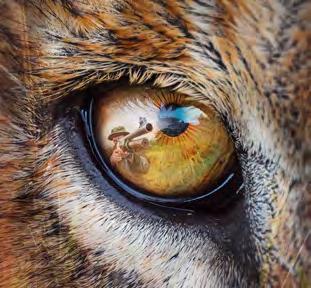
10 18 8 4


Barbie the orphan gorilla was less than two years old when her family was likely killed by poachers, and she was shot in the head. Miraculously, thanks to our wonderful Ape Action Africa colleagues, the terrified baby recovered at their sanctuary in Cameroon.
Today, Barbie has been adopted by a ‘family’ of rescued orphan gorillas. Could you give her a life-changing gift of Comfort & Joy? Scattered food trails in her rainforest enclosure encourage natural foraging behaviour, a vital aid to recovery for this complex, intelligent species.

Your gift of Comfort & Joy could transform Gopal’s world Chris Packham: wildlife warrior, living legend

Our great ape cousins don’t belong in zoos

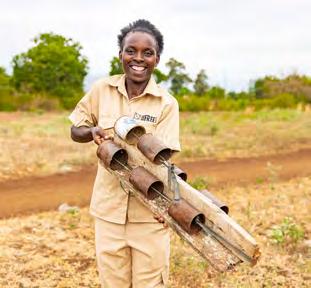
You’ll be so inspired by our team of Wildlife Heroes
Born Free Foundation, 2nd Floor, Frazer House, 14 Carfax, Horsham, West Sussex, RH12 1ER, UK bornfree.org.uk | info@bornfree.org.uk +44 (0)1403 240170 bornfreefoundation bornfreefdn bornfreefoundation bornfreefoundation bornfreefoundation
The views expressed in Wild Life are not necessarily those of Born Free. If you have any comments or issues you would like to raise, please write to the Managing Editor.
Could you look after Barbie this Christmas? One last thing:
Will Travers - Managing Editor: will@bornfree.org.uk
Celia Nicholls - Editor: celia@bornfree.org.uk, Claire Williams - Graphics & Brand Manager: claire@bornfree.org.uk
Registered Charity No: 1070906
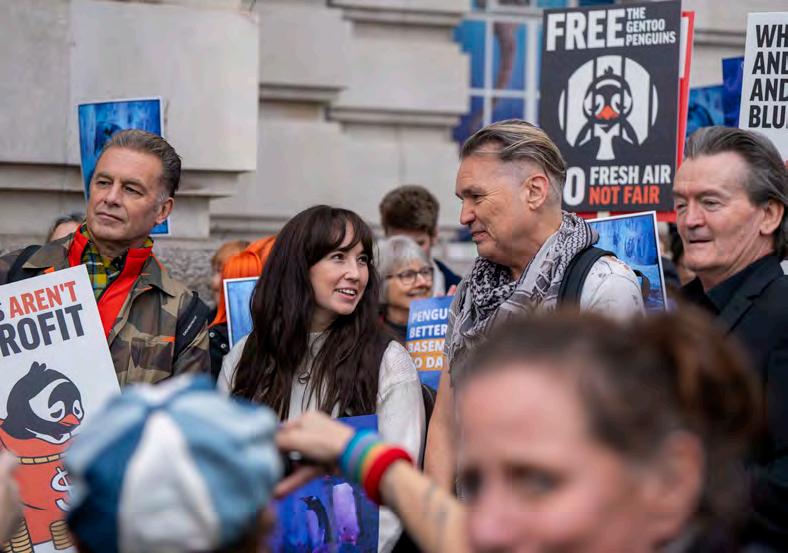
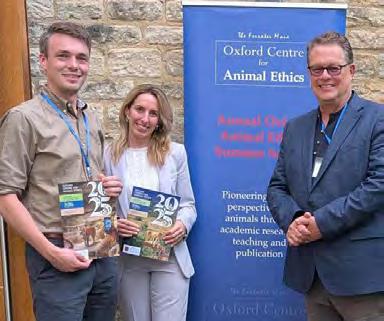
Can it ever be morally justified to keep wild animals captive? Born Free co-sponsored a University of Oxford symposium to consider the issues, welcoming 150 academics from 20 countries. “What a pleasure to represent our charity at such a prestigious event, with people who share a vision for a more compassionate future,” said Chris Lewis from our Policy team, who spoke about elephants in zoos.


A lioness has been seen with a family of cubs in our charity homeland of Meru National Park, Kenya. Every lion matters, of course, but why are we so thrilled? Three years ago, our team found Sahara with an arrow in her leg. ‘Conflict’ can be a big problem so, with your support, we help farmers protect livestock and coexist with lions. Thankfully, after expert treatment from the Kenya Wildlife Service vet team, Sahara recovered and is now doing her bit to bolster Kenya’s lion population!
Hundreds of you joined Chris Packham CBE, Feargal Sharkey OBE, Megan McCubbin and Dale Vince at our peaceful protest outside Sea Life London aquarium, in October. Fifteen gentoo penguins – among the fastest swimming and deepest diving of all penguin species – are trapped in a basement pool, just 7ft deep, with no fresh air or daylight.
With our support, a Freedom for Animals campaign calls for the 15 to be moved to a better home.
“The vastness of Antarctica and the southern islands, versus a perpetually dingy underground bunker beside the Thames – this is no place for penguins,” said Chris. “This ghastly situation is a Victorian relic of abject animal abuse. These poor birds have never seen the sun. It’s obscene.”

Hold the front page!
Huge news from our friends at OrcaLab, in Canada. Our adopted orca, 25-year-old Springer, has had a new baby. Back in 2002, she was just two when her own mother died and she became lost. Found alone near Seattle, USA, we helped take her 250 miles by boat, back to her wild family – despite pressure from the captive industry to ‘keep her safe’. Now, this awesome orca is mum to three calves of her own.
Earlier this year, you raised over £55,000 for pangolins – to fight illegal trade, fund conservation, and care for orphans. So, we knew you’d love this picture! Joey was rescued from trade in Malawi, by our colleagues at Lilongwe Wildlife Trust. After a full health check, he was returned to the wild – fitted with a tracking device, so his journey can be followed and his safety assured.

From olive colobus in Benin, to black-and-gold howler monkeys in Argentina, Born Free and the Primate Society of Great Britain make a great team! For 20 years, our modest but vital grant has supported early-career local conservationists. “It’s wonderful our annual contribution has continued for so long,” said our delighted Policy Advisor and ape expert Ian Redmond OBE, who helped initiate the scheme in 2005.

Why would a wildlife charity clear up rubbish? To help protect animals, our team in Ethiopia organised a community tidy up – including 250 soldiers from the local base. “We picked up an incredible 3,500kg of litter,” said Ayano Urgecha from our Community Engagement team. “Animals can ingest plastic, or become trapped or injured, and their homes damaged. So, we really care about waste management!”
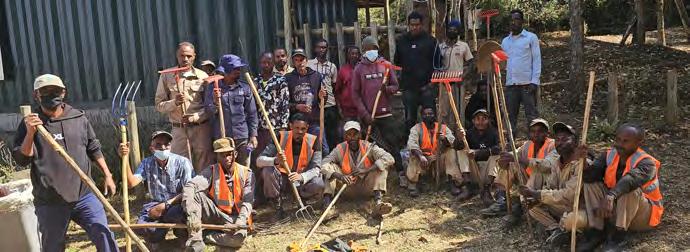
With your help, rhinos have recovered so well in Meru National Park, they’re now boosting numbers hundreds of miles away. Led by Kenya Wildlife Service, ten white rhinos were moved to Loisaba Conservancy, including four from Meru. When we began supporting rhino conservation in Meru in 2014, Kenya had 1,047 rhinos. Today, this has risen to 1,977 – what a victory!

You know it, we know it, and the facts are undisputable. Great apes don’t belong in zoos. Life in captivity harms their health and well-being. Our recent headline-grabbing report (page 33) outlined the evidence and called for the phasing out of apes in UK zoos (then Europe, then the world!).
“When we look into the eyes of apes in captivity we see something painfully familiar – sadness, frustration, a yearning for life in the wild,” said our Patron, broadcaster Nicky Campbell OBE. “Caged and gazed at, when they were meant to roam forests and feel the rain on their backs. We must choose not to visit zoos that keep them in captivity.”


In a major breakthrough for conservation, scientists now recognise four species of the world’s tallest animal – not just one. “We’re especially excited that reticulated giraffes are now an official species,” said our Head of Conservation, Dr Nikki Tagg. “Some 1,400 live in Kenya’s Meru Conservation Area, and you help us keep them safe. Since 2021, we’ve ID’d 500+ individuals, and removed 1,600+ deadly snares.”


Could you take on a challenge to raise funds? The remarkable Storey family climbed Mount Kenya – Africa’s second highest peak. But we’ve something for everyone, from familyfriendly walks to global adventures. You can run, cycle or swim – or how about the London Winter Walk on 24th or 25th January 2026? Find out more at bornfree.org.uk/ challenge-events-calendar
Hosted by Will Travers, our free Turn the Tide for Tigers webinar was a unique opportunity for hundreds of supporters and sponsors to be inspired by our expert colleagues, in Central India. Since Born Free founded the Satpuda Tiger Landscape Partnership in 2004, with your support India’s tigers have seen a phenomenal increase, from 1,411 to some 3,682 today.



Footsteps to Freedom Ball
19th March 2026
Royal Lancaster London W2 2TY
Join Born Free on the night of our 42nd anniversary, for our exclusive black-tie event, hosted by Kirsty Gallacher. Mingle with our celebrity Patrons and other friends, enjoying a glorious evening of inspiring stories and films, fine dining, fund-raising, dancing and entertainment.
Find out more at bornfree.org.uk/events

Heartfelt congratulations to TV auctioneer James Lewis and partner Ed Otter, who celebrated their wedding day in September. A beloved Patron for years, James has helped raise vast sums, conducting auctions at our events. “Wishing you a lifetime of love and happiness,” said our Events Manager Joanne Bartholomew. “We so appreciate your asking for donations to Born Free, instead of gifts.”
With your support, a fleet of five new motorbikes are transforming our outreach in Meru National Park, Kenya. “These bikes play a vital role,” explains Ivy Malemba from our Kenyan Comms team. “Now our conservation ambassadors can reach more communities, cover wider areas, and respond to wildlife issues quickly and effectively.”

Momentous news – Europe’s brand-new elephant sanctuary is about to officially open for business. Yes, you heard right. After years of our planning, hard work and endless dreams, Europe – at last – will have a large-scale facility to rehome elephants.
Set within 1,000 acres of natural habitat, in the warm climate of south-central Portugal, Pangea’s mission is simple, but enormous. To provide a lifelong haven for elephants in need, rehomed from zoos and circuses in Europe.
Pangea has been created with YOUR help. In 2015, we launched an appeal to build a much-needed elephant sanctuary in Europe. You responded in your thousands! Ten years on, our shared vision is now becoming a beautiful reality.
At Pangea, elephants will receive expert care and be free to roam, forage, and socialise amidst rolling hills, streams, meadows and woodland. Thanks to a habitat restoration programme, native wildlife will also thrive.
Born Free is a founding member of Pangea, with our friends and colleagues at Fondation Brigitte Bardot, Olsen Animal Trust and World Animal Protection.


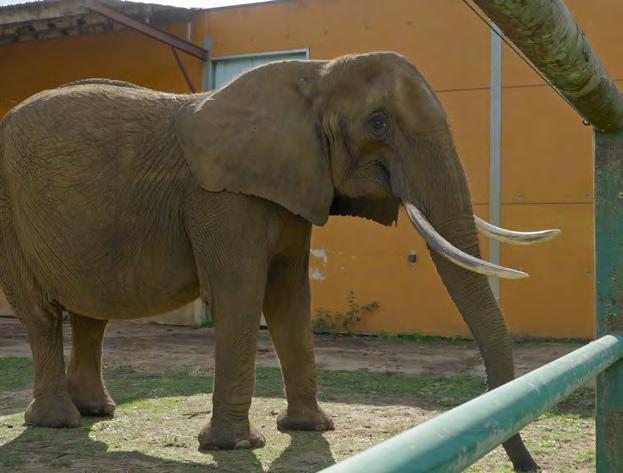
Excited? We’ll be in touch with an update in the New Year, plus details of how you can get involved. We’d love to hear from you!
Every story we share, from rescues and campaigns, to updates from the wild, is created with you in mind. Now, we’d love to know what you think. Are there ways we could make the magazine more engaging and impactful?
Please complete our short online survey — your feedback will help us shape future issues.



Our Co-Founder, Dame Virginia McKenna, in conversation with her long-term friend Dr Johan Joubert, who is retiring after 30 years as vet and Head of Wildlife at Shamwari, South Africa.

Johan, it meant the world to me when Shamwari offered to create a sanctuary for rescued big cats. Can you believe we have been working together for 28 years?
Yes, time goes quickly! But it’s been 28 wonderful years. And we learned so much… becoming aware of the challenges of animals in captivity and the opportunity to make a difference in some of their lives.
Back in 1997, Shamwari kindly offered a forever home to Anthea and Raffi, the first lions Born Free rescued. It had broken my heart to see them in that tiny cage on a rooftop bar in Tenerife. I wept with joy to see them set foot in their three-acre enclosure – with shady trees, space to run, undergrowth to explore, sandy soil to roll in… How do you remember that day?
It surely was a day to remember. Raffi was like a bullet out of his crate and then stopped to look at his new enclosure. Anthea was a bit slower, quite wary to walk on soil. Fortunately, she quickly calmed down. Initially they showed some repetitive stereotypic behaviour (learned in Tenerife), but that resolved within days. We got so attached to them. Together, we gave them a really good life at Shamwari.
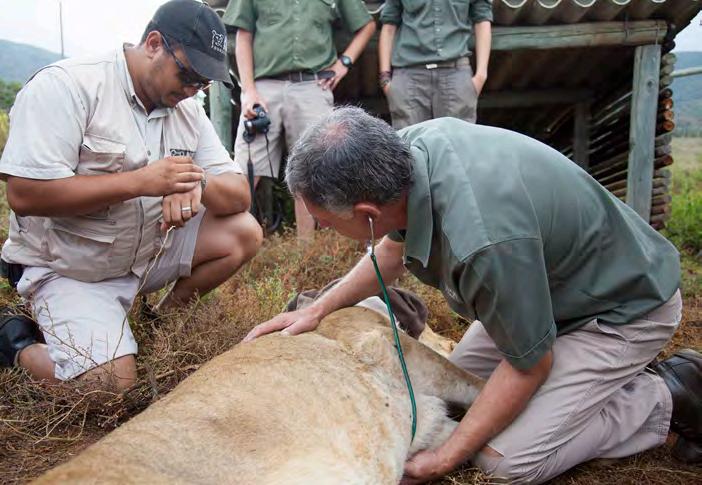
Over the years, Shamwari has transformed the lives of 38 Born Free lions and 14 leopards – rescued from zoos, circuses and the pet trade. Thank you and all the team for cherishing each one! Each rescue gives a cat a second chance at life AND highlights the plight of countless others. All unique… but do any hold a particular place in your heart?
All of them were special. I will, however, never forget Kuma, the leopard rescued from an Ivory Coast zoo, in 1999. As it was the first rescue I went on, I was quite nervous. Language barriers and uncooperative airport staff didn’t help. But, it all ended well. Eventually I had a special bond with Kuma.
Today Shamwari is home to eleven Born Free lions and four leopards, including young lion brothers Tsar and Jamil, from a farm in Ukraine, who arrived last March. They were followed two months later by leopard mother and daughter, Alda and Ginny (my nickname), from an illegal breeding facility in Poland. It’s such an honour to have a leopard named after me, I was deeply touched! How have these four settled in?
Tsar and Jamil are, at present, my favourite Born Free animals. They’re very relaxed and love to show off (see pic left). Two very happy lions! Alda and Ginny also settled well (see pic right). Typical leopards, they prefer their enclosure’s dense vegetation. And viewing is on their terms. I am so glad we can provide this for them.
Thank you and the Born Free Shamwari team for caring for our big cats so well! It is such a comfort to know they’re so respectfully looked after... But I know it’s a huge challenge. How do you ensure they have the best possible lives?
I must acknowledge Born Free Manager Catherine Gillson, Animal Care Manager Glen Vena and their team. They treat all animals as individuals, always finding ways to enrich their environment. They ensure they have a good view of the reserve beyond their enclosures by building viewing platforms, where they can climb up and overlook trees to see wild animals in the distance.
It’s hard to believe it, Johan, but you have decided to retire. Huge congratulations from me personally, everyone at Born Free, and all our supporters. Your lifetime’s work has made such a positive difference to so many. We’re going to miss you so much! But, I am sure as one chapter closes, another opens. What are your plans, and will wild animals still play a significant role?
Yes, it’s time to slow down a bit. As you know, wild animals are my life. I will surely keep a close eye on Born Free, Shamwari and the other projects I was involved in. I am keen to share my experience where needed. And thank you for trusting me with the veterinary care of our precious Born Free animals.

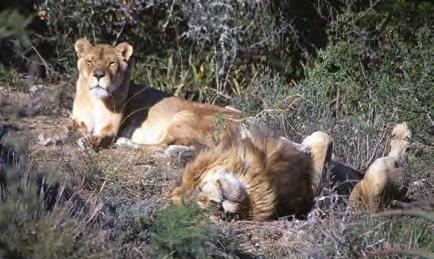
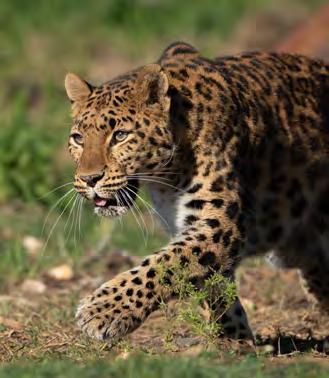
Enjoy a short film about Johan at bornfree.org.uk/heroes, as part of our Wildlife Heroes series, and see page 28 to meet some more heroes.
Thanks to our invaluable partnership with Shamwari Private Game Reserve, Born Free transforms the lives of rescued lions and leopards at our sanctuary in South Africa, which has been accredited by the Global Federation of Animal Sanctuaries.
From the world’s fastest sprinter, to the longest legs and largest ears on Earth... With your help, Born Free is devoted to some spectacular species. But, which ones and why?
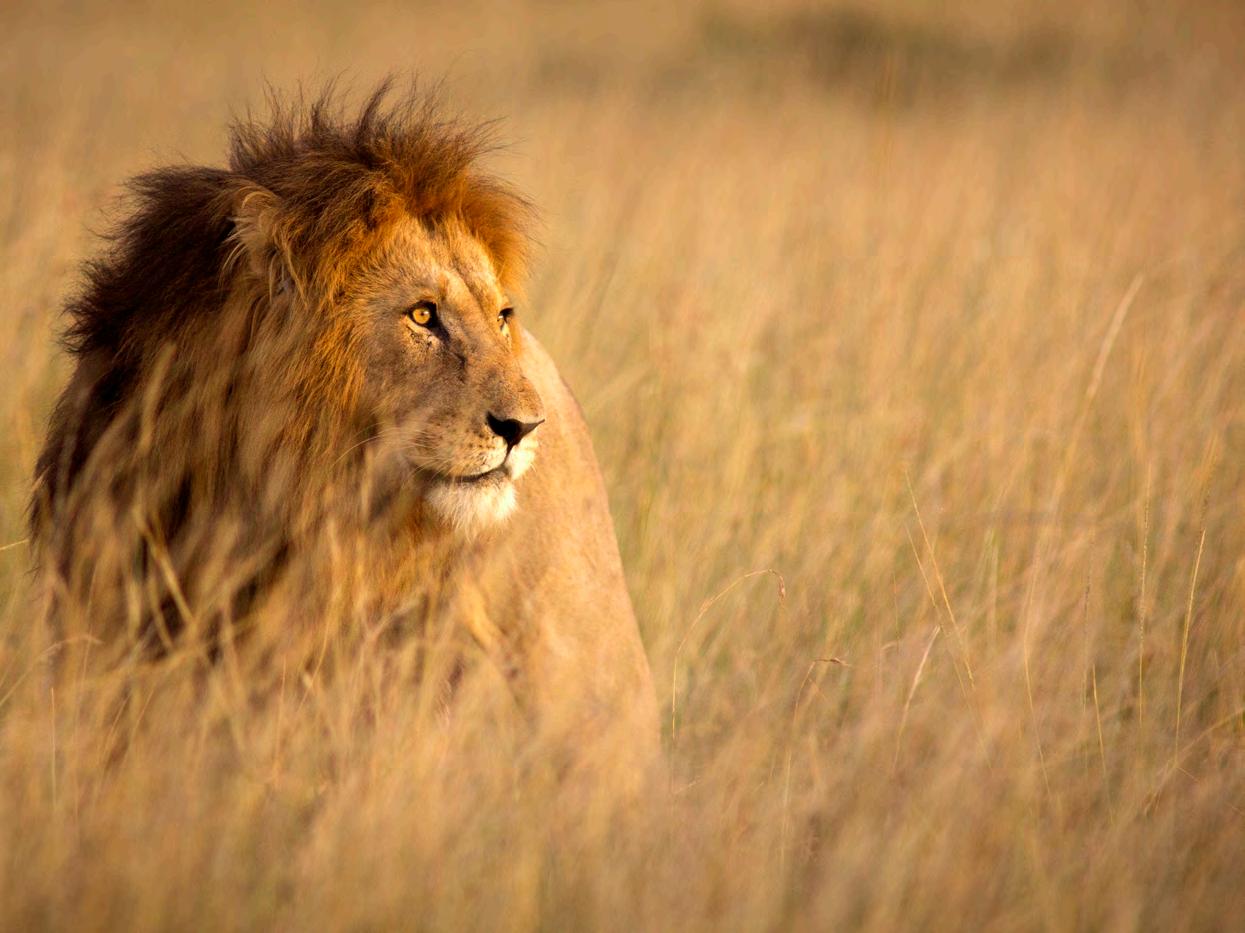
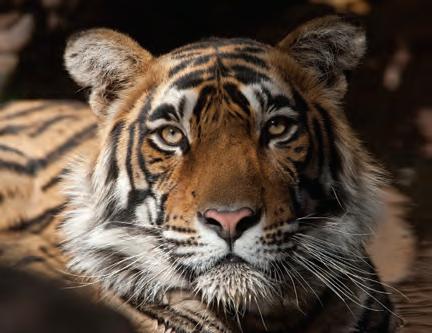











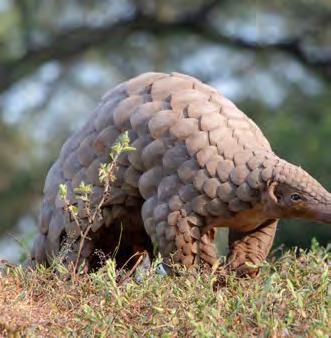


There’s no one like Born Free! Our charity has a unique approach to wildlife – we keep threatened species safe in the wild AND fight to end their exploitation, not least in captivity.
To have the biggest impact, we specially focus on six iconic species or groups of animals. Well-known and widely loved, these flagship species are ambassadors, who fly the flag for a multitude of other animals:
• In the wild, within their natural habitats and ecosystems
• In captivity, exploited for outmoded entertainment
But what do we do?
With you by our side, we take action for:
1. Individual animal welfare, including rescue and care
2. Compassionate conservation in the wild, with local people
3. Community engagement, education and empowerment
4. Wildlife-friendly policies and legal protections to help keep animals safe.
See an animation of the adverts, and enjoy a filmed interview with George at: bornfree.org.uk/not-for
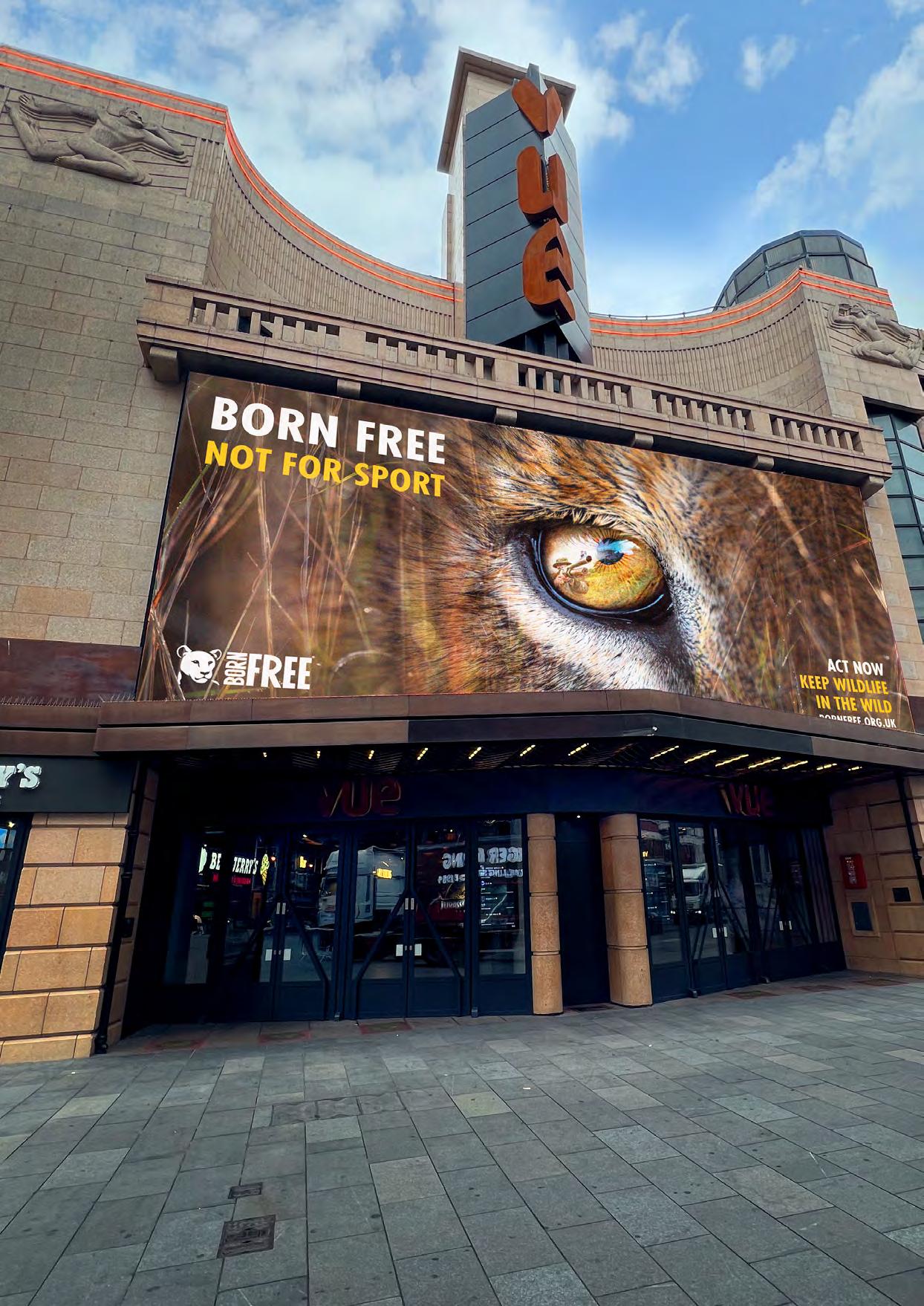
Did you see our recent advertising campaign? Launched on digital billboards across London, before appearing on screens across Birmingham, Edinburgh, Glasgow and Manchester, our hard-hitting animated adverts stopped people in their tracks and encouraged action.
Featuring key Born Free campaigns and running out over three months, the exceptional adverts were created by outstanding photographer George Logan, in collaboration with Ocean Outdoor and thanks to their generous Drops in the Ocean grant. The hard-hitting adverts featured still photography brought to life through digital animation.


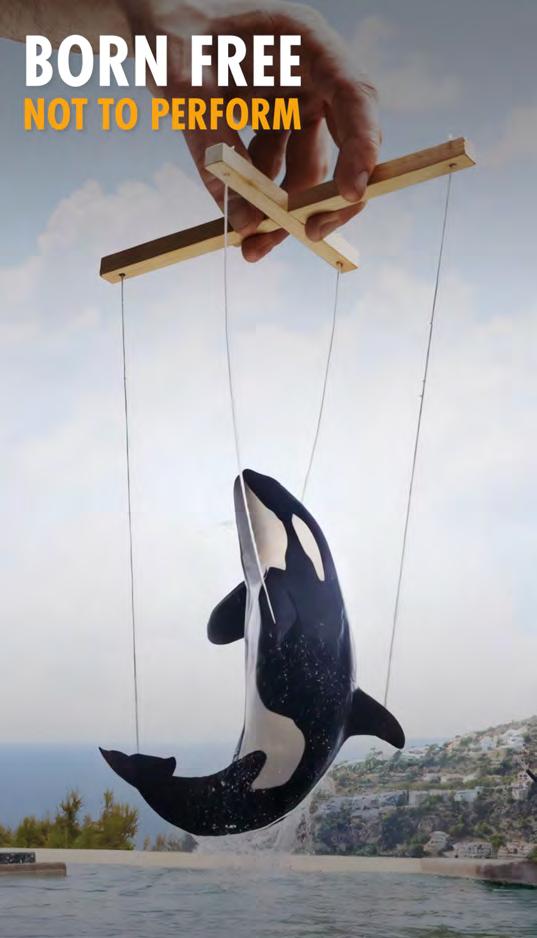


A critically-acclaimed photographer and concept artist, George’s work has supported Born Free since 2010.

How would you describe your unique approach?
My photography is conceptual... I like storytelling and I love animals. I needed to do something that meant something to the world – something I was passionate about. So, 15 years ago I got in touch with Virginia McKenna. She replied the very next day. I’ve been working with Born Free ever since!
Why was this new campaign important?
All the causes are so worthwhile, and we’ve got a unique approach. We worked out early on you can’t just show negative imagery of poached wildlife. So, we like to think we approached it in a cleverer way... it’s conceptual, we show ideas and hopefully that catches people’s attention.
Is one issue particularly close to your heart?
Well, all of them. But the most despicable is trophy hunting. You’re looking at something astounding, like a male lion in the wild. And I’m looking through the lens (of my camera), while a hunter is looking through the sights of a rifle. And then they pull the trigger... It’s the most selfish and ungodly thing to do. And I don’t understand why they do it...
How do you create maximum impact without alienating your audience?
It’s a fine line. You want the viewer to take the problem on board and think about why it’s happening, without being too horrified. We try and get our audience thinking, without being too blatant. But it’s a call to action, and you hope people see the adverts and go, ‘Wow, I didn’t know that, I’m going to do something about it’.
Your dream for humanity’s relationship with wild animals?
I’m always an optimist. I hope the human race will change. We have to do something before it’s too late, or there’ll be nothing left for future generations to love. When you go out into the African bush, you’re seeing something spectacular, and it feels like it’s from the dawn of time…


It all started with one. Since the day we began, thanks to your huge support, Born Free has had a mammoth commitment to protect elephants and end their exploitation. Dr Mark Jones reports.
At Born Free, every individual life matters. The spark that ignited the creation of our charity, in 1984, was the plight of a single young African elephant, Pole Pole. Wild-born in Kenya, she was euthanised, alone, at London Zoo in 1983 – aged just 17.
Her lonely existence, confined in concrete thousands of miles from her homeland and family, and her untimely death stirred our founders into action. Though our iconic logo features Elsa the lioness, it was Pole Pole who inspired our commitment to end the injustice of captive exploitation and protect the world’s wildlife.
Meet the elephant
Elephants are majestic creatures who have featured in human mythology, art and culture for millennia. But they’re so much more. These intelligent, highly
social, emotional beings deserve respect and protection. For Born Free, securing the wellbeing of individual elephants and the future of wild populations, represents everything we stand for.
Why they matter so much Elephants are extraordinary. They mourn their dead and form lifelong family bonds. They navigate vast landscapes, remember watering holes from decades past, and even show empathy toward other species.
These huge herbivores are ‘gardeners’ of the forests and savannahs of Africa and Asia, acting as vital dispersers of seeds. They mould, change and renew the landscape, benefitting thousands of other species. Of all species, elephants are a remarkable symbol of the natural world’s complex and deeply interconnected nature.
They also hold a special place in so many people’s hearts. Having the opportunity to see elephants in the wild, aided by incredible television documentaries, is a privilege no-one could forget. Elephants remind us what we’re fighting for – a future where animals are free to live their lives in peace, on their own terms.
“Elephants disperse more seeds of more species further than any other animal. This is why ecologists refer to them as mega-gardeners of the forest and savannah.”
Ian Redmond OBE
Born Free’s Policy Advisor and world-acclaimed ele-expert (first person to scientifically report on Mount Elgon’s worldfamous salt-mining underground elephants)

Three species
– African savannah, African forest and Asian
The largest land mammal
Males can weigh 6+ tonnes
They can live 70+ years
Exceptional long memories
3 70+
Their brains are 4x size of ours 4x
Complex social networks
Families led by matriarchs
With your help, our history is steeped in efforts to save elephants – enhancing protections in the wild, and standing firm against cruelty and exploitation.
Rich emotions
Include joy, affection, grief and compassion
They roam
Up to 4,000 sq miles (8% size of England)
They communicate over vast distances
With sonic rumbles (too low for our ears)
‘Ecosystem engineers’
They play a key role in their habitats 6+ TONNES
Will Travers drove a 600,000name petition to Switzerland, to help secure an international ivory trade ban.
Returned Nina, kept in a zoo for 27 years, to the wild in Tanzania — one of the first acts of elephant rewilding.

Partnered with ele-expert Cynthia Moss and Amboseli Trust for Elephants in Kenya – our first-ever field project, supported to this day.

Supported a safe haven for orphan Asian calves in Sri Lanka, returning them to the wild.

Our successful Ele-Free London campaign marked the end of 172 years of elephants held captive at London Zoo.
Helped secure a ban on elephants and other wild animals in UK circuses.
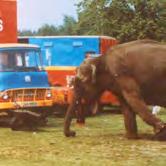

After our long campaign, UK Ivory Act banned trade in most elephant ivory products (extended to hippo and whale ivory in 2025).
Launched Saving Meru’s Giants in Meru, Kenya, to monitor elephants and mitigate conflict with people.
Released our groundbreaking Elephants in Zoos – A Legacy of Shame report, exposing the cruelty of captivity and calling for a responsible phase-out.

2023
Our Enough is Enough animation, narrated by Founder Patron Dame Joanna Lumley, called to end elephant captivity and won gold at the Smiley Charity Film Awards.
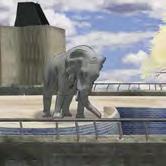
Community conservation
Across their wild range, elephants face growing pressures from human activities. As our populations expand, so pressure on their habitats and migratory routes increases.
Changes in land use, pressure on water supplies, and habitat changes due to climate breakdown all compromise elephants’ access to food and water, plus their ability to migrate. As habitats shrink, elephants come into increased conflict with people – crops are destroyed and, tragically, lives are lost on both sides.
Elephants in decline
Africa’s elephants have reduced from ten million a century ago, to less than half a million today. But, if they’re protected, elephants can recover. With our help, Kenya’s population has steadily risen from some 16,000 in the late 1980s, to around 36,000 today. However, elephants across the continent continue to face serious threats. There is much work to do!
In collaboration with partners and by working with local communities, we monitor and protect Kenya’s elephants. Around 1,000 are found in Meru Conservation Area and our Saving Meru’s Giants project – launched in 2021 – facilitates their peaceful co-existence with people.
We implement simple, low-cost solutions such as tin can shakers and beehive fences (elephants are afraid of bees!) to help local people protect crops, provide them with alternative sources of income, and promote coexistence. We also run workshops, using a giant puppet to help people understand elephant behaviour and how to behave to reduce the risk of injury.
“When communities see elephants as partners, not pests, both can thrive. This is conservation with compassion.”
Dr David Manoa Born Free’s Head of Kenya Conservation

1. Fighting ivory trade
Over recent centuries, the bloody ivory trade has claimed the lives of millions of elephants. Despite the 1989 international ban, trade and trafficking of ivory has persisted. This is fuelled by demand and facilitated by lax national laws – and weak enforcement – in some countries. Thousands of elephants continue to fall victim to poachers each year.
To help resolve this tragedy, demand for ivory urgently needs to be reduced through ‘domestic trade bans’. After our long campaign, the UK’s Ivory Act is one of the toughest in the world, and aims to prevent recently-poached ivory from entering the UK market. We monitor its implementation, including the online sale of ivory, and publish our findings. We also support ranger patrols to protect wild elephants from poaching.
2. Trophy hunting
Cruel trophy hunters target elephants for ‘sport’, to obtain trophies to hang on their walls. Over the past decade, 79
countries declared imports of over 7,500 elephant trophies, mostly from southern Africa. In recent years, several of Africa’s few remaining ‘super-tuskers’ – with tusks weighing 100lbs or more – have been shot by trophy hunters in Tanzania and Botswana.
This killing of older elephants results in the suffering and death of individuals. But it also has a devastating impact on the social stability of family groups and the ‘genetic health’ of populations.
3. Wild captures
It’s grotesque, but elephants are still cruelly taken from the wild to ship to zoos around the world. Since 2010, more than 500 live, wild-caught African elephants have reportedly been imported by 30 countries.
Born Free campaigns at every level – from grassroots petitions to international treaty negotiations –seeking to permanently outlaw these immoral practices.

Elephants aren’t trophies, or commodities to be traded. They’re complex, sentient beings, with a right to live their lives as they have evolved to do.
Challenging exploitation
Thousands of captive elephants suffer around the world in zoos and circuses, or exploited for the tourist industry. Forced to live in tiny enclosures, with no choice who they live with, they are paraded in public, and abused for tourist rides, selfies, festivals and ceremonies.
“Every year, we receive hundreds of ‘Red Flag’ tourist reports concerning captive elephants around the world. We continue to call for an end to such exploitation and need everyone’s help to make those in power listen and act.”
Sarah Jefferson
Born Free’s Captivity Campaigns
Information & Raise the Red Flag Coordinator
In 2025, after a decade of reports and consultations, the UK government released its revised Standards of Modern Zoo Practice. These contain marginal improvements for elephants in zoos, but:
• Still allow the ‘ankus’, a cruel hook designed to control elephants through pain and fear, until 2030
• Give zoos 15 years to increase enclosure sizes to a lamentable two hectares.
In the UK we use Pole Pole’s story to discuss captivity with primary school children. Our workshops and resources help ensure the next generation feel compassion and empathy towards animals.
Born Free continues to campaign to end the keeping of elephants in zoos in the UK, Europe, North America and beyond. We will never stop until the suffering ends.

Pangea sanctuary
As part of our campaign to end the cruel incarceration of elephants, we campaign for a ban on their importation and breeding. But how can we ensure the remaining elephants can live out their lives in the best possible conditions?
One of our most exciting developments is our role in the creation of Pangea, Europe’s first large-scale, purpose-built elephant sanctuary. This will give at least some captive elephants a ‘forever home’ and a better life.
Set in a vast, natural environment in Portugal, Pangea is designed for elephants who have endured lifetimes in captivity. It will offer space, social opportunities, and peace. See page 7 to find out more.
“Captive elephants continue to suffer reduced lifespans, high infant mortality, poor health, inadequate social opportunities, and enclosures thousands of times smaller than their wild range. We don’t need more studies, reports, and recommendations for incremental improvements to elephant enclosures. We need an end to the keeping of elephants in zoos.”
Chris
Lewis
Born Free’s Captivity Research and Policy Manager
From Pole Pole, to the thousands of elephants whose lives we touch today, Born Free has never lost sight of the individual. Every step forward – every law changed, every sanctuary opened, every snare dismantled – brings us closer to a world where elephants can live free, safe, and respected.
Elephants are ancient, wise and threatened. And they depend on us. Every elephant matters. With your support, Born Free will never stop fighting for them.
“If we cannot find it within ourselves to save and protect elephants, then nothing is safe, because nothing can capture our imagination and speak to our souls like an elephant.”
Will Travers OBE
Born Free’s Co-Founder & Executive President
Dr Mark Jones
Veterinarian & Born Free’s Head of Policy
markj@bornfree.org.uk
You could encourage natural behaviours, aid recovery and support well-being.
As the festive season gets underway, you could transform the lives of 12 precious species. Each rescued from appalling conditions, these animals have endured so much. But, your gift today could help them recover and thrive!

1. Lion
Ensessa Kotteh Wildlife Centre, Ethiopia
You could give a lion like Kebri (rescued after his mother was killed) enticing pungent herbs tied up in a sack to investigate, pounce on and roll around with.

7. Serval

2. Leopard
Big Cat Sanctuary, Shamwari Private Game Reserve, South Africa

3. Tiger
Bannerghatta Tiger Sanctuary, India
You could give a tiger like wild-born Gopal (rescued after conflict with people), tantalising food treats hung up high to leap up, tussle and devour.

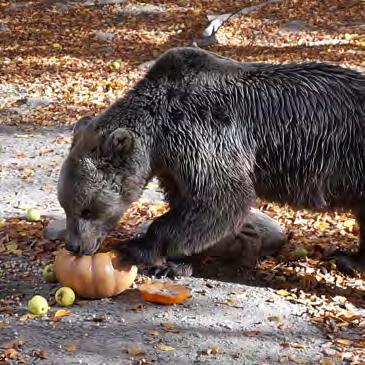
You could give two pools for water play – these small, long-legged cats (rescued from the pet trade) love to pounce and splash!
You could give a big cat, like Zeiss the leopard (rescued from a zoo), a viewing platform to climb up and gaze across their landscape – they love this! Panthera Africa Big Cat Sanctuary, South Africa
You could give bamboo puzzle feeders, filled with tasty treats and hung up for cheetahs (rescued from the pet trade) to investigate and devour. 8. Cheetah
9. Brown bear
Ensessa Kotteh Wildlife Centre, Ethiopia
Arcturos Bear Sanctuary, Greece
You could give a rescued bear like Manolis (orphaned due to conflict with people) a pumpkin stuffed with tasty treats such as chestnuts, walnuts, carrots and honey.
You could turn their suffering into comfort — and their fear into joy. Scan me!
To make a donation, scan the code, call 01403 240170 or visit bornfree.org.uk/comfortandjoy

You could enrich a rescued animal’s life this Christmas
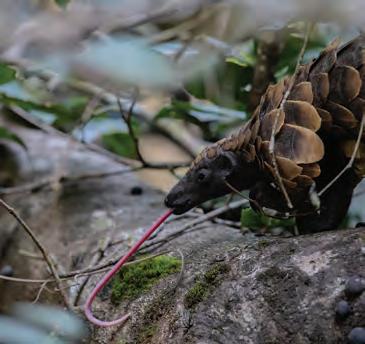
Lilongwe Wildlife Centre, Malawi
You could donate a termite trail to encourage natural feeding behaviour –one pangolin (orphaned by poachers) eats up to 200,000 termites a day!

Ensessa Kotteh Wildlife Centre, Ethiopia
You could donate hard to reach meat, hidden in boxes filled with straw, tied up with raffia string for rescued hyenas (orphaned due to conflict with people).

Ape Action Africa’s Mefou Primate Sanctuary
You could scatter a food trail throughout a large rainforest enclosure, so a rescued gorilla like Nona (orphaned by poachers) can forage.
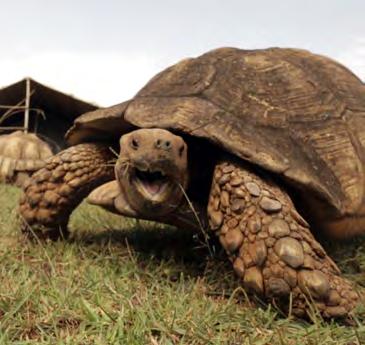
Ensessa Kotteh Wildlife Centre, Ethiopia
You could donate brush heads to scratch against – tortoises (rescued from the pet trade) love rubbing their shells against the bristles!

Ensessa Kotteh Wildlife Centre, Ethiopia
You could give the world’s only grass-feeding primate (rescued from the pet trade) a cardboard tube stuffed with grass to enjoy!

12. Chimpanzee
Limbe Wildlife Centre, Cameroon
You could give tasty treats squeezed into bamboo tube puzzle feeders to help rescued chimps (orphaned by poachers) keep busy and content.
You could enrich a rescued animal’s life this Christmas
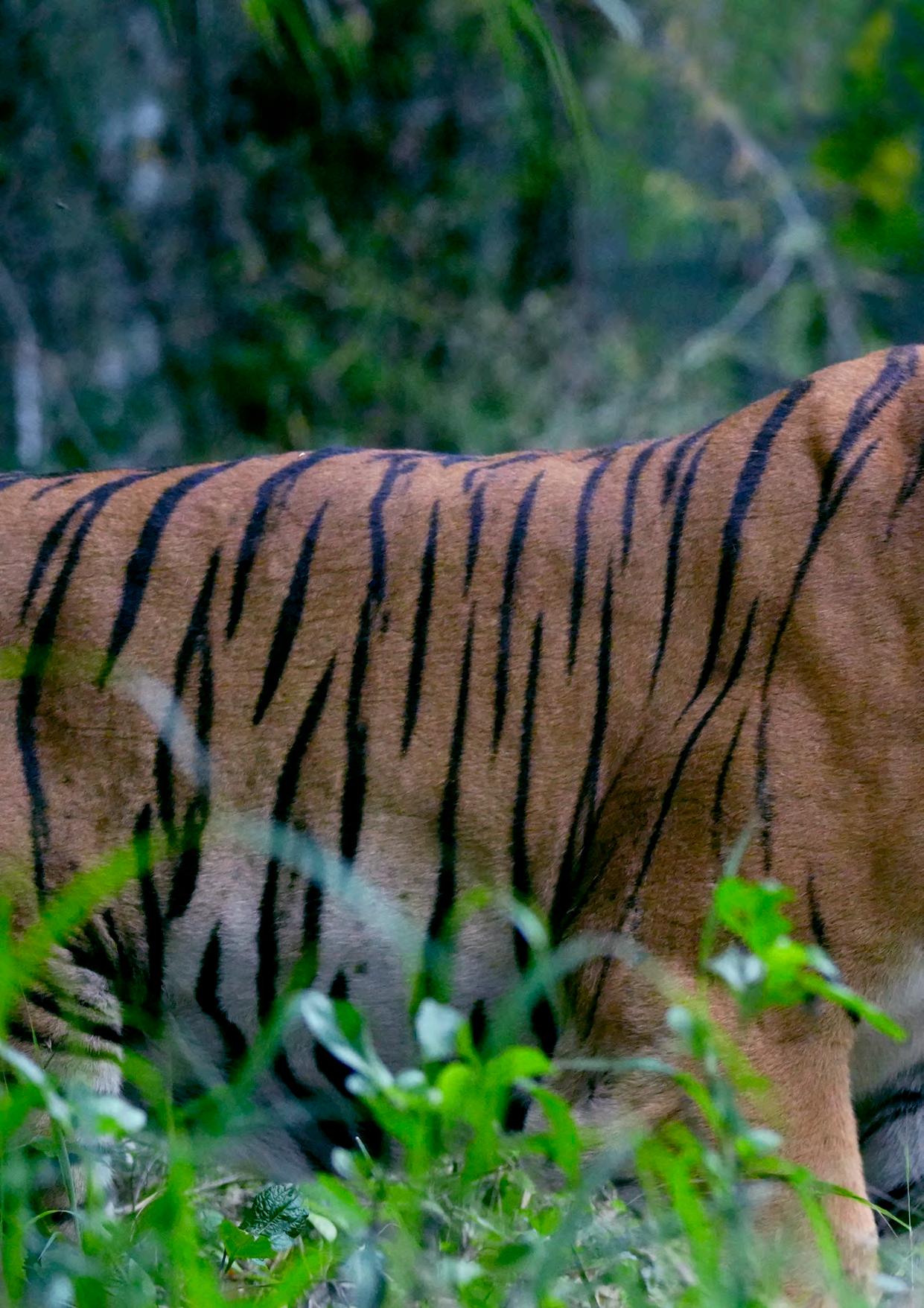

Gopal’s sad story
Bannerghatta Tiger Sanctuary, India
Born in the wild, Gopal was captured when he came into conflict with people, after preying on their cattle. Unfortunately, the authorities in India didn’t think it was possible to return him to the wild.
Instead, Born Free and our Wildlife SOS Partners helped give him a lifetime home. Today, with your help, Gopal could patrol his spacious forest enclosure, following a scent trail laid by his dedicated care team.
Meanwhile, our work continues to help wild tigers to safely live in harmony with local communities.




With your help, Born Free has a unique approach to protecting the largest of big cats, explains Maggie Balaskas. Together, let’s stop suffering and keep tigers safe in the wild.
With a flame-orange coat slashed with jet-black stripes and piercing gaze, it’s no wonder tigers are so iconic. Beautiful, intelligent and strong...
I’ve been incredibly fortunate to see tigers in the wild in India, watching in awe as they effortlessly navigate dense vegetation, lounge in lakes, or doze in dappled sunlight on the forest floor. They truly are BIG cats, yet, as if by magic, can vanish – melting into the undergrowth – before your eyes.
Enchanting yet terrifying
Each of the 20 rescued tigers
Born Free has rehomed over the years has a unique story. Each a bittersweet reminder of why every individual matters. A testament to our unwavering determination to protect tigers and the wild places they live.
Their vast range once stretched from the frozen forests of Far East Russia, to the tropical mangroves of the Sundarbans, in India and Bangladesh. Today, in just 7% of their historic range, tigers occupy fragmented habitats in ten countries, across Asia.
Tigers are solitary and highly territorial. Males defend vast areas which may overlap with several females, but not other males. Tigresses are powerhouses! Nurturing parents, skilled teachers, and fiercely protective guardians, they’ll fight to the death to defend their cubs.
Of nine subspecies, only six survive today:
Bengal
Indochinese
Malayan
Amur (Siberian)
South China (extinct in the wild?)
Sumatran
Three went extinct in the last century:
Caspian
Javan
Bali

Heard almost two miles away, each tiger’s roar is unique
Enables communication across dense forest.
Tigers love water!
Excellent swimmers, they regularly cross rivers.
Each tiger’s stripe pattern is unique
Like a fingerprint – which helps ID individuals in the wild and in illegal trade.
are tigers orange?!
Many prey species can’t see this colour, so tigers appear green and black in dappled forest light.
Tigers take down large prey
From deer to boar, even young Asian elephants and rhinos.
Tiger crisis
Sadly, this captivating cat faces many threats both to the survival of the species and to individual welfare:
• Poaching
• Illegal wildlife trade
• Habitat loss
• ‘Conflict’ between people and tigers
• Exploitation in captivity
This is why Born Free has such a holistic approach!
Mining, logging and deforestation all lead to habitat loss, as well as farming, palm oil plantations, settlements, roads, and railways – exacerbated by rapid human population growth. As habitats fragment, human encroachment has squeezed tigers into ever-shrinking areas.
Tigers come into conflict with farmers, persecuted for killing livestock (which competes with natural prey for resources). People can even be attacked by tigers, which, as you can imagine, can fuel retaliatory killings.
Grotesquely, tigers are also killed for their body parts – used in traditional Asian medicines and as luxury items. This drives a lucrative illegal trade. Tigers are poisoned, electrocuted and snared – these indiscriminate methods killing other species too.
Poaching and illegal trade go hand in hand – inflicting much suffering and driving a decline in populations.
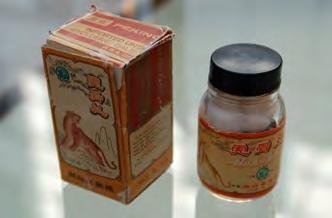
“The proliferation of tigers bred in captivity to supply consumers with bone tonics, amulets made from claws and teeth, and skins as luxury decor, is acutely concerning. Ongoing trade stimulates poaching in the wild and perpetuates the suffering of individuals kept in appalling conditions. We’re fighting to end cruel tiger farms.”
Gabriel Fava Senior Policy Advisor, Born Free
Today just 5,660 remain in the wild Of these, 3,682 found in India (page 25)
Captive suffering Tigers are also abused in captivity. Confined in zoos (average enclosure 40,000x smaller than their natural range), forced to perform in circuses, languishing in tiger farms, imprisoned as status symbols pets. They can’t live healthy and natural lives.
Protect tigers, save so much more! As a ‘keystone species’ and apex predator, tigers have a big impact on their environment. By helping maintain herbivore populations they prevent overgrazing and reduce disease.
By protecting just one tiger in the wild, we also protect 25,000 acres of forest, home to a myriad other species. This forest provides ‘ecosystem services’ for millions of people. Trees absorb carbon dioxide, store carbon, release oxygen and pump water vapour into the atmosphere. These form weather systems, delivering rain thousands of miles away. Thanks tigers!
“Protecting tigers encompasses protecting their habitat and their prey. When we save tigers’ wild homes, we’re not only saving millions of other species, but also helping mitigate the negative effects of climate change.”
Kedar Gore Director of The Corbett Foundation (our partner)
Captivity
Since our inception, Born Free has been at the forefront of tackling captive big cat exploitation. Since our first rescue of six tigers from a UK circus in 1987 (see below), our unfaltering campaigning has led to the end of wild animal circuses throughout Britain.
Our 2023 Selfish Selfies report highlighted the traumatic and often short-lived life of tigers bred for cub-petting and photo opportunities. We campaign to end their exploitation for tourist entertainment and degrading shows.
In 2024, our hard-hitting Clawing at the Cages report exposed the inadequate conditions tigers experience in zoos, the deprivation of natural behavioural opportunities, and the appalling health issues suffered.
Our recent UK Dangerous Wild Animals Act research revealed 219 wild cats kept privately in Britain, including seven tigers! We have much to do.
We’re calling for:
• A ‘Roar-Free UK’ with no big cats kept in zoos or as pets
• A review of wild animals kept as pets’ legislation
• The UK Government to enact the Animals (Low Welfare Activities Abroad) Act and stop travel companies advertising cruel activities overseas eg tiger photo props.
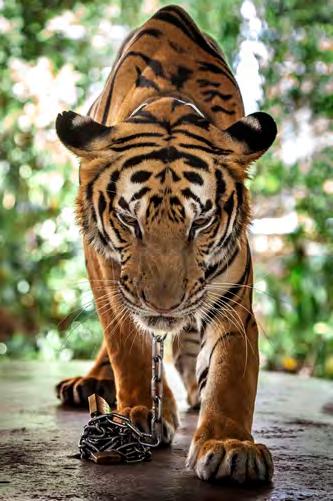
“Tigers have undergone thousands of years of evolutionary adaptation to thrive in their ecological role. When kept in zoos, circuses, as pets, or used as photo props they live a life completely alien from that in the wild. We work tirelessly to end all forms of big cat captive exploitation.”
Chris Lewis, Captivity Research & Policy Manager, Born Free
Rescue & care
Our first ever rescue
In 1987, we took six tigers from a squalid trailer at Cross Brothers Circus, UK to a 15-acre forest sanctuary in India (later becoming Bannerghatta Tiger Sanctuary).
We’ve since helped 14 more tigers, rescued from captive exploitation and conflict situations in the wild. Today we support the lifelong care of male tigers, Gopal and Sandro.

Gopal arrived at Bannerghatta Tiger Sanctuary in 2014, having come into conflict with people in Nagarahole National Park. Dignified Gopal, now 17 years old, resides in a spacious forested enclosure, diligently cared for by the expert Wildlife SOS team, who manage the sanctuary and co-fund his care (see page 20 to help).
Meet Sandro
Sandro was rescued from a tiny enclosure at a terrible zoo in Spain, that closed in 2019, after our 16-year campaign with other organisations. After recovering with our friends at Belgium’s Natuurhulpcentrum wildlife centre, Sandro travelled to Animanatura Wild Sanctuary, in Italy’s Tuscan hills. Here he enjoys a spacious grassy enclosure, under their dedicated care.
“Thanks to your continued support, Gopal continues to live a life that honours his wild spirit – peaceful, protected and respected.”
Kartick Satyanarayan CEO & Co-Founder, Wildlife SOS
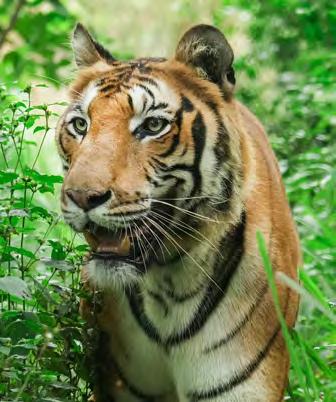


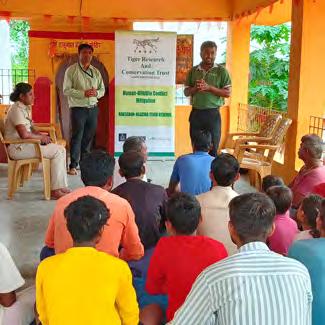
Do the Satpuda forests of Madhya Pradesh and Maharashtra states offer the best hope for India’s remaining Bengal tigers? Over 1,000 live in Central India’s protected areas – reserves connected by forest corridors, India’s largest block of tiger habitat.
The Satpuda Landscape Tiger Partnership, developed by Born Free and Oxford University’s Wildlife Conservation Research Unit in 2004, unites nine Indian organisations working across this vast landscape. Together, we address conflict, invest in conservation education, and work on policy issues.

Born Free funds the Partnership, including our incredible coordinator, Yashvardhan Dalmia, based in Mumbai. In a vital role, he assists with communications, monitoring, coordination, and evaluation.
With Born Free’s support, the nine dedicated organisations undertake activities from tiger research, monitoring, and human-wildlife conflict mitigation, to lobbying against destructive development projects and running alternative livelihood and rural development initiatives.
Born Free supports education in local schools, teaching children about wildlife and coexistence. We reached over 2,500 pupils, in the last year alone! In the same period, a Mobile Health Unit provided over 11,000 people in rural villages with medical care. These essential services encourage people to support tiger conservation.
We help supply locals with fastgrowing, nutritious green fodder for livestock, producing a colossal 157 tonnes last year. Cattle grazing in the forest are vulnerable to attack from tigers. So, this project reduces conflict, leaves wild food for wild herbivores, and increases tolerance for tigers.
Our Community Engagement team partners with Drawing for the Planet’s Tigers’ Forest project, with partners in India, Singapore and Malaysia. We celebrate the iconic Bengal and Malayan tigers through artwork, with 1,500 children from across five countries learning about tigers and the diverse species inhabiting their landscapes.
“One need not be a scientist or a biologist to be a saviour of wildlife or the environment – you only need the will and the passion to do it.”
Poonam Dhanwatey
Tiger Research and Conservation Trust
We fight to end tiger farming and trade in products by any means we can. This includes through CITES*, the international regulator of commercial trade in wildlife. Although under this convention, tigers cannot be bred or traded commercially, some countries still do so.
Alongside fellow organisations, we advocate to hold governments accountable, to clamp down on illegal possession and trade, and close domestic markets. This November, Born Free will attend the CITES COP20** meeting in Uzbekistan and push for critical measures to protect tigers to be implemented without delay. We’ll report back!
Born Free’s vision for a kinder future. With you by our side we’ll:
• Campaign to end tiger exploitation in zoos, circuses, as pets, in farms, and to end trade in their products
• Work to secure their future in the wild, where they belong, in flourishing habitats connected by corridors (safely co-existing alongside people)
• Rescue, relocate and care for tigers exploited in captivity (hoping one day sanctuaries won’t need to exist)
• Increase critical thinking about the role of captivity in education and conservation in UK schools
• Continue to encourage young people to love and respect tigers through art and education.
Maggie Balaskas
Head
of Rescue & Care maggie@bornfree.org.uk
*UN Convention on International Trade on Endangered Species **Conference of the Parties, the decision-making body of the Convention
“I love Will, I think he’s absolutely brilliant. I have tremendous respect for him and Born Free.”
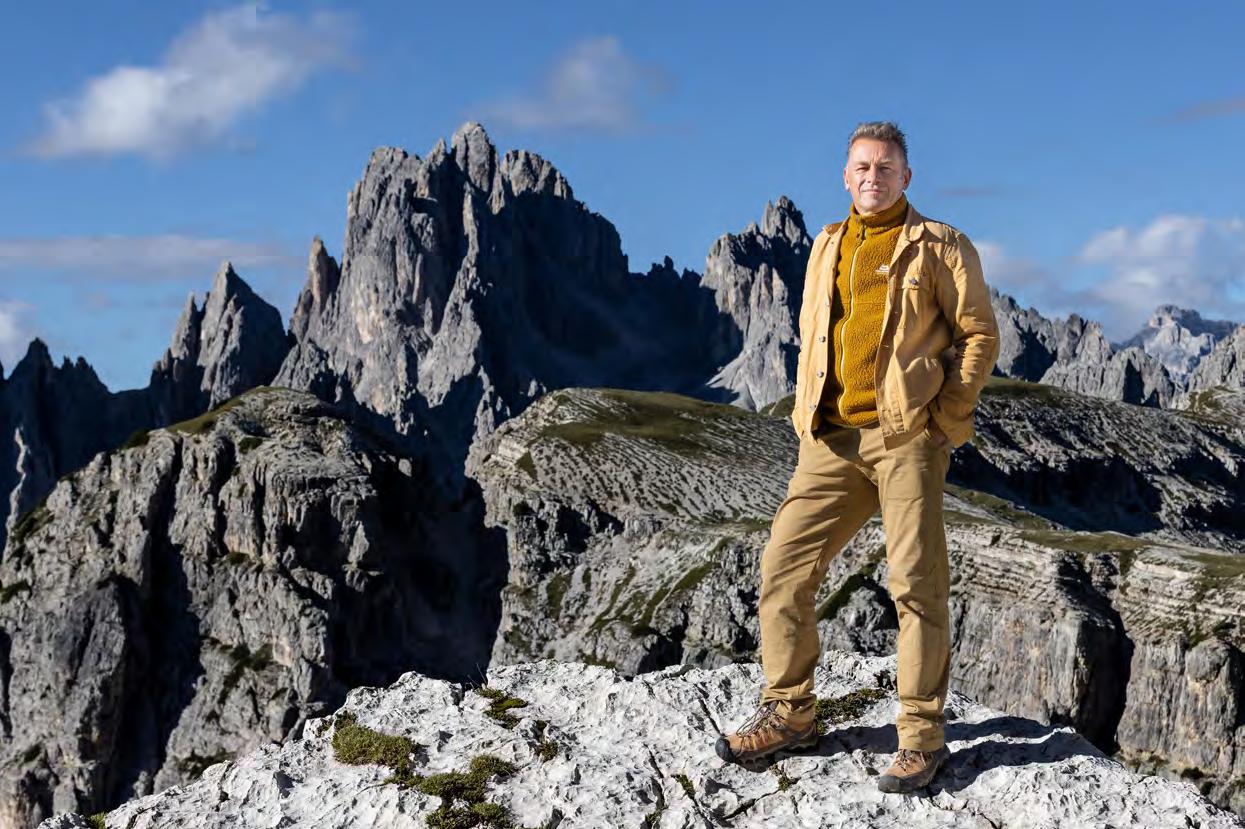
Born Free’s British Wildlife Advocate, Dominic Dyer, chats to his friend and fellow campaigner, Chris Packham CBE – acclaimed naturalist, TV presenter and activist.
Its simple beauty… it doesn’t have to be rare or exotic. Yesterday I just sat watching pond skaters for half an hour. It brought no end of joy. I must have seen my first pond skater 60 years ago, but still marvel at their ability to skip across the surface of the water. I love that I can be enthralled by the enduring fascination of animals which are common and all around me.
I can’t have a favourite, it’s impossible... I do like things that fly – dragonflies and birds of prey, particularly. But I’m going to cheat and say the black miniature poodle. As a neurodiverse person I recognise the extraordinary role they’ve played in securing my life –reducing anxiety, offering calm and kindness, and frankly boundless joy.
impact do TV shows like BBC’s Springwatch have?
The programme’s underlying vocation is to generate a deep-rooted affinity for those species we live amongst. We don’t have to go to nature reserves to see wildlife. Life exists all around us and can prosper there. We seem to have put wildlife on a list, like paintings we visit in art galleries, and exhibits in museums. We shouldn’t have to go to special places to see wildlife. So that’s what Springwatch seeks to overcome.


It’s multifaceted and I think it’s our perception that’s wrong. Children are given books of three kinds – a book of pets, companion animals which they love and share their lives with, a book of exotic animals they perceive to be okay to look at in zoos, and then a book of farm animals it’s okay to eat. We need to break down those barriers and see all animal life as equal and valid.
That’s an understatement of enormous magnitude. These reports are excellent beyond belief. They are brilliantly produced – understandable and accessible. The research is impeccable, and they present an entirely undeniable, unambiguous outcome in the way we should be treating animals in captivity. I am the greatest champion of those reports.



I started my scientific career studying badgers in the 1980s, for five years. I made a great investment in badgers, and badgers sympathetically made a great investment in myself. I’ve done everything I can to campaign against that cull. It is the most despicable, lamentable, unscientific, uneconomic, divisive and disastrous policy rolled out in the UK countryside in our lifetimes. It saddens me beyond belief.
To understand the psychology of those people that want to pull the trigger on something and kill it for pleasure…? I’ve never been able to get to that point. It’s not just about the killing, or economics. The vast majority are rich white males travelling to poor, developing countries to exploit their natural resources. Ultimately, it’s still a relic of colonial resource exploitation and that’s something we ought to focus upon. It’s one of the few things that can drive me to absolute despair. Utterly beyond comprehension.
Of course, because they promote conversation that is hopefully creative, and which allows us to move forward in our thinking. They generate a platform to air ideas and facilitate empowerment. When I go on a march or sign a petition, I am part of a community of people who recognise the need for change. So please do not stop. We need you on the streets, we need you on your keyboards.
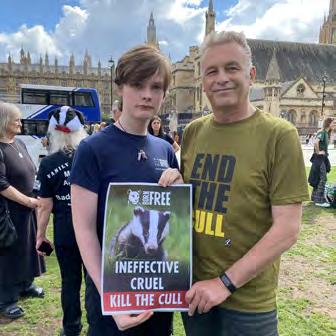
Well supporting Born Free of course, but also to audit their own lives to make a positive difference. Think about eating less meat. I’m not going to preach, but all the science says cut back in terms of biodiversity loss, our environment, your health, and animal welfare. Please think about moving towards a more plant-based diet.
Born Free works tirelessly as a small independent charity that isn’t beholden in the same way some of the larger charities are. It can be free speaking, can talk truth to power, and isn’t more committed to its own conservation than the animals it wants to protect.
That we wake up, realise it’s imperilled and do something about it. Humans are remarkable – imaginative, creative. At a certain point, history shows us we reach tipping points. Then, all of a sudden, everyone wakes up and thinks we’ve got to fix a problem. Whether it’s Covid, Nazism, slavery… we think ‘This is not good, we have to fix this’. And then we do.
My job at the moment and the job of Born Free, is to get people to that tipping point as rapidly as possible. I’ll do everything I can to keep life on earth alive, because I love life and I love all life.
*See page 33
To read Chris’s complete interview visit bornfree.org.uk/chris-packham
Prepare to be inspired! Our thought-provoking new series of short films shines a light on some exceptional people who, with your support, dedicate their lives to wild animals.
“Have you watched Wildlife Heroes: Stories of Courage, Care and Conservation yet? Our powerful seven-part film series introduces you to colleagues and community members whose lives are bound up with wildlife, every single day. Each seven-to-eight-minute film is a lens into the heart of Born Free’s mission.
“I was inspired to create this series when I saw the extraordinary commitment of the people who dedicate their lives to protecting, rescuing, and caring for wild animals, and witnessed the courage of communities living alongside wildlife.

Glen Vena
Animal Care Manager
Big Cat Sanctuary
Shamwari Private Game Reserve
South Africa
“They face immense challenges. Yet these remarkable people carry on, often making huge personal sacrifices, because they truly believe every individual animal matters. Meeting them changed me completely. I hope these films allow you to see their life-changing work as I did.”
Amanda Poole-Connor Head of Comms & PR amanda@bornfree.org.uk


“Nothing is scripted or staged. These authentic, beautifully shot testimonies reveal the difficulties but also offer hope, grounded in compassion, resilience, and an unwavering belief that wildlife belongs in the wild.”
Martin Miritiawo
Senior Animal Care Assistant
Big Cat Sanctuary
Shamwari Private Game Reserve
South Africa

Bereket Girma
Country Director
Ethiopia
A tin can shaker can deter elephants from crop-raiding

Samim Kaari
Community Conservation Ambassador
Saving Meru’s Giants
Meru National Park
Kenya
To enjoy the inspiring films visit bornfree.org.uk/heroes and see page 8 to meet our seventh hero Dr Johan Joubert. With huge thanks to Leakey Studios, whose wonderful production brought our heroes’ stories to life.
“I hope Wildlife Heroes inspires you, as it inspired me. Protecting wildlife is not just about species and numbers, it’s about individuals, human and non-human alike, and building a shared future worth believing in.”
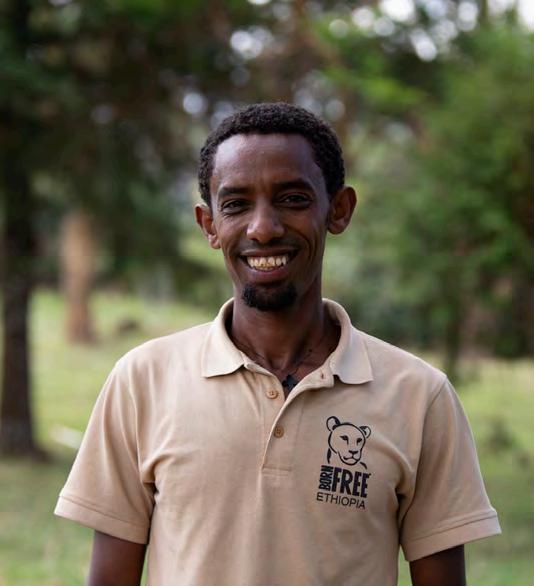
Hailu Dagmachew
Veterinary Technician & Animal Care Supervisor
Ensessa Kotteh Wildlife Centre
Ethiopia

Jackline Ntinyari
Twiga Team Eco-Scout
Saving Meru’s Giants
Meru National Park
Kenya
Known for strength and close-knit family life, our cousin the gorilla is the biggest of all apes. Each one is precious but, to save them we need your help, reports Dr Nikki Tagg.

Talk like a gorilla
• Range of sounds includes grunts, whimpers, whines and chuckles
• Yes! Gorillas laugh when they play
• Soft belches make contact when family are out of sight
• Excited gorillas bark, hoot, roar or scream
• Male displays combine these calls as they charge, strut and throw vegetation
Gorillas. In some ways so much like us – we share some 98% of DNA. But, in so many others they’re completely unique. The very thought conjures up magical images of misty dense rainforests and the thunderous, rumbling sound of a chest beat. What an honour to help protect gorillas!
Did you know the gorillas’ forest homes are one of our biggest allies in tackling the climate crisis? Vital ‘carbon sinks’, they draw in billions of tonnes of atmospheric carbon every year.
The vast rainforests of the Congo Basin, for example, capture and store 1.2 billion tonnes of carbon each year.
To protect forests, we must keep safe the interconnected web of species inhabiting their ecosystems. Gorillas are particularly crucial, as these huge vegetarians disperse seeds through their dung. This is often deposited next to their night nests, commonly made in open-canopy areas – where an abundance of sunlight promotes plant growth. Nature is incredible!

Born Free
2001
Founding partner of UN’s innovative Great Ape Survival Partnership, addressing threats faced by gorillas, chimpanzees, bonobos and orangutans.
2002
Became Secretariat of UK’s Ape Alliance, chaired by Ian Redmond.
2004
Began long-term support for Limbe Wildlife Centre (rescuing apes) and Last Great Ape Organisation (fighting ape trade), in Cameroon.
2009
Supported gorilla rangers driven from their homes by armed militia in Kahuzi Biega National Park, DRC.
2022
Launched ‘Guardians of Dja’, to protect gorillas and their rainforest habitat in Dja Landscape, Cameroon.
2024
Began supporting Ape Action Africa, Cameroon, giving lifelong care to gorillas and other primate victims of the trade in bushmeat (meat from wild animals).
“Seeds that have been chewed, and the protective coat partially digested in the gut, land on the forest floor, wrapped in fertiliser (dung) in a light gap, perfectly prepared for germination. What better place for seedlings to grow into the trees of tomorrow. If we protect tropical trees but not the gorillas, we’ll see a slow death of the forest ecosystem.”
Dr Ian Redmond OBE, Born Free’s Policy Advisor and world-acclaimed ape expert (who famously introduced Sir David Attenborough and the BBC’s Life on Earth to gorillas in 1978!)
Two gorilla species are found in Central Africa – Eastern gorillas (Gorilla beringei) inhabit the east, Western gorillas (Gorilla gorilla) towards the west. Each species is further divided into two subspecies.
Sadly, the International Union for the Conservation of Nature (IUCN) classes three of these four subspecies as ‘Critically Endangered’. In recent generations, increasing threats have led to serious declines.
Mountain gorillas, the Eastern subspecies famously studied by Dian Fossey, are the only subspecies to

Eastern lowland (or Grauer’s)
Where: Democratic Republic of Congo
How many: ~3,800* declining
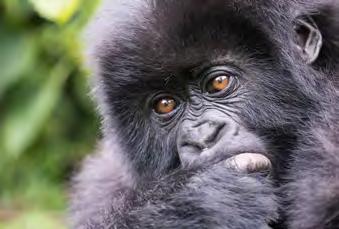
Mountain
Where: Uganda &Rwanda
How many: ~1,004* increasing
*Assessed 2016-18
increase in recent decades – thanks to extraordinary conservation efforts. Nevertheless, they remain isolated and vulnerable.
Protecting magical gorillas and ending their exploitation has been a big Born Free priority for decades. We value each individual, the species, the future of entire forests and – by extension –our planet!
Primates, including gorillas, are a priority group of animals in our new five-year strategy. We must do everything we can to rise to the challenges they face across their range.
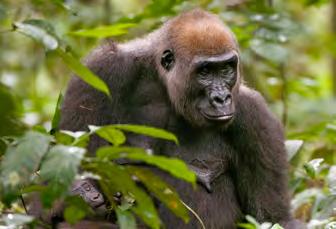
Western lowland
Where: Republic of Congo, Central African Republic, Angola, Gabon, Equatorial Guinea, Cameroon & Nigeria
How many: ~316,000* declining

Cross river gorilla
Where: Cameroon & Nigeria
How many: ~250-300* declining
Under threat
Gorillas in the wild face a barrage of threats, pushing them closer to extinction. Illegal hunting and the bushmeat trade decimate populations. At the same time, their forest homes are cleared, fragmented, and degraded to make way for large scale oil palm cultivation and mineral extraction.
Then there is disease. Tragically, outbreaks like Ebola have caused mass ape deaths since the 80s. In some cases, 95% of a population has died, taking years to recover. Also, due to climate change, there’s evidence
Conservation
Our Guardians of Dja programme is already changing the story in Cameroon. Our mission? To protect this vital landscape, preserve wild inhabitants, and build a future where people and wildlife thrive together.
To increase sustainable livelihoods, we deliver skills training. For example, cocoa farming is a wildlife-friendly alternative to bushmeat hunting. We also support law enforcement, and tree-planting initiatives to restore gorilla habitat.
Education
Lasting change comes from knowledge, so our bespoke curriculum supports primary school education in Dja. Engaging and empowering communities is key to protecting gorillas – not least celebrating wildlife through fun activities such as football tournaments! By raising awareness and giving local people the tools to flourish and coexist, we can help their breathtaking wild neighbours do the same.
“Education is a game changer. With knowledge we can, over time, start to nurture new ways of seeing and valuing nature.”
Laura Eastwood Born Free’s Head of Community Engagement
their range is suffering ‘climate flipping’, becoming much drier. This could lead to droughts and susceptibility to wildfires.
In the lush rainforests of Cameroon’s Dja Biosphere Reserve, gorillas live side by side with a plethora of animals including wildly intelligent chimpanzees and elusive forest elephants. But this habitat is under threat. Traditional livelihoods rely on unsustainable and damaging activities in the forest, such as bushmeat hunting and ‘slash-andburn farming’ – trees are cut and burnt to create a field.


Grotesquely, gorillas are hunted for their meat, a grim reality for our great ape cousins. Gorillas are large-bodied and slow to reproduce – raising just one infant every few years. So, any loss is a serious blow to their population. Bushmeat hunting is not just cruel, it’s unsustainable, and a major driver of population decline.
But, the brutality doesn’t end with the kill. When adults are slaughtered, infants are often left alive. Orphans are trafficked as exotic pets, or sold to unscrupulous captive facilities for public entertainment, or tourist attractions.
Malnourished, vulnerable to disease and suffering abuse and isolation, traumatised infants are denied everything it means to be a gorilla. Their family, their freedom, a chance to grow up in the wild.
Against trade
We’re committed to ending this exploitation, working with partners to investigate, expose and campaign against the illegal ape trade. We also help provide care and rehabilitation for the lucky ones rescued.
We partner with two vital Cameroon sanctuaries – Ape Action Africa and Limbe Wildlife Centre, who expertly rehabilitate gorillas, and deliver local education programmes. Every gorilla rescued is a story of survival and a ray of hope for ending this cruel trade.
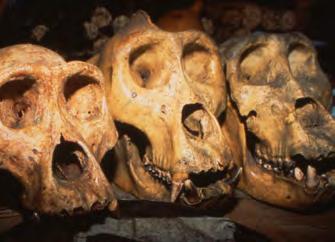
Stolen from the wild as an infant, Twiggy was smuggled to Nigeria, and spent six years as a pet. Thanks to the combined efforts of several organisations, including Born Free, she was repatriated to Cameroon in 2004, alongside her companion, Brighter.
Together, they began a new chapter at Limbe Wildlife Centre. Sadly, due to her early abuse, Twiggy has a paralysed right arm. Fortunately, the centre provides the specialist care she needs to live a safe and enriched life.
Captive exploitation
In zoos, gorillas and other great apes are usually kept in inappropriate social groups, and in conditions completely alien to those they evolved to live in. Not surprisingly, they suffer physically and psychologically, often exhibiting unnatural and damaging behaviour. Stressed individuals may even be given antidepressants.
Claims made by zoos that keeping great apes is essential for conservation and education don’t stand up to scrutiny. Zoo-born great apes:
• Are often hybrids (crosses between species or subspecies)
• Are habituated to the close presence of people
• Haven’t learned the skills needed to survive in the wild So, as you can imagine, they aren’t good candidates for release.
Viewing great apes in zoos can give a distorted impression of their normal behaviour and how rare they are. We don’t need to keep great apes captive to learn about their lives in the wild!
Born Free is determined to safeguard gorillas – our close cousins, yet so mystical and unique. We will do everything we can to ensure the mesmerising image of gigantic chestbeating gorillas, deep in the dense forest, doesn’t fade in our mind’s eye.
Born Free has supported wonderful Limbe Wildlife Centre ever since, helping care for rescued gorillas, as well as chimpanzees (and grey parrots!).
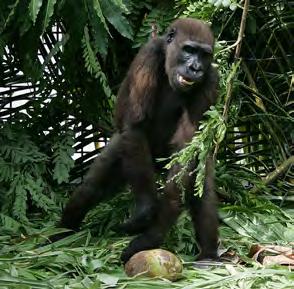
It’s clear: we want an end to the illegal ape bushmeat and infant trade, no gorillas to be kept in zoos, and for their habitats to be protected and restored.
We want a world where gorillas remain wild and free – in the forests they’ve called home for millennia. And, with your continued support, we won’t stop our fight until that world is real.
Dr Nikki Tagg Head of Conservation nikkit@bornfree.org.uk
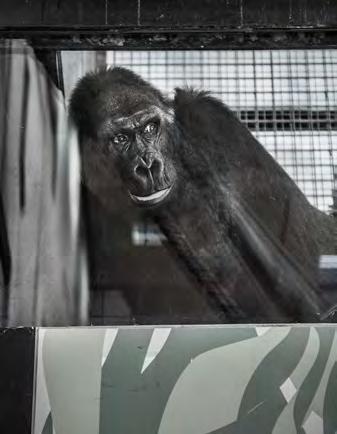
Earlier this year, Born Free’s major new report Our Captive Cousins –The Plight of Great Apes in Zoos, hit the headlines. We clearly outlined the issues and ethics of keeping gorillas, and other great apes, captive for ‘entertainment’.
Our evidence undeniably shows this exploitation can’t be justified. We call for an immediate end to the breeding and importation of great apes into zoos. Apes in zoos must be humanely phased out, with every consideration for the welfare of every individual.
“Many of us are fascinated by the other great apes, not least due to the similarities we see between themselves and us. his also makes us uniquely positioned to empathise with their suffering and lack of freedom.
“Less than half of Britons consider it acceptable to keep great apes in zoos. It’s clear: modern society is increasingly concerned by keeping such highly intelligent animals captive. Confining these complex beings for our entertainment can no longer be justified on the basis of science, welfare, or animal and public safety.”
Chris Lewis, Born Free’s Captivity Research
& Policy Manager.
FIND OUT MORE
Read the report and sign our pledge at bornfree.org.uk/ resource/ captivecousins

May we introduce Donald Mbohli?
A conservation hero, he’s devoted to securing a safe future for the awe-inspiring gorillas he loves, in the vast rainforests of Cameroon.
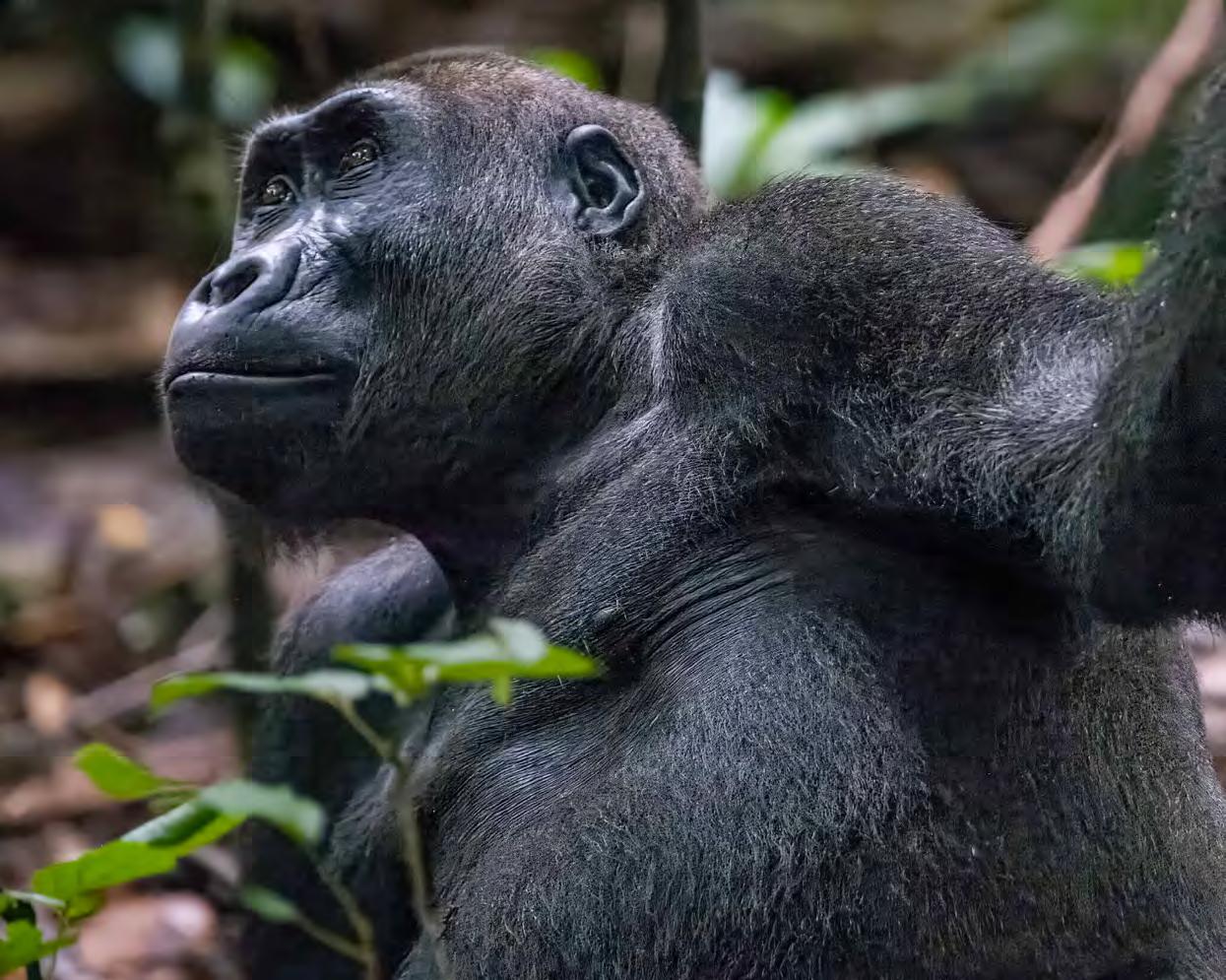
“I’m from the northwest region of Cameroon,” Donald explains. “I studied environmental science at the University of Buea, then project management at Atlantic International University. I’m now applying this knowledge to Born Free’s Guardians of Dja programme.”
In a typical day, Donald sets off from Yaoundé (Cameroon’s capital city) at 6am, his Toyota packed full of supplies –rubber boots and raincoats for eco-guards, wild mango seedlings for farmers, notebooks and pencils for school children. On the way he’ll stop to buy provisions for his trip – fresh fish, bread and plantain, plus a few pineapples or watermelons.
After three hours of driving, the tarmac ends abruptly at the town of Messamena, north of Dja. Donald pulls onto the dirt track that will take him to the reserve. At Malen V – the last village accessible by car – he parks up and continues his journey by motorbike. Crossing a long wooden bridge over the River Mpou, which can be safely navigated by motorbike at dry times of the year (saving Donald a long walk), he eventually reaches his quarters in Doumo Pierre at around 3pm.
Name: Donald Mbohli

Nationality: Cameroonian
Role: Guardians of Dja Programme Lead
Status: Gorilla champion
Over the next few days, Donald will convene meetings and sit for hours listening to community members, welcoming everyone who knocks on his door, sharing his meals. He’ll help resolve any issues, distribute earnings to hard-working pepper farmers, then organise the next month’s activities (find out more page 32).
There are many challenges – from a fallen tree across the road disrupting plans, to daily reminders of the incessant pressures on the forests, such as the widespread presence of bushmeat* for sale at the side of the road. But Donald exudes a calm and professional optimism, fuelled by his passion for nature.
He tells us about an extraordinary encounter. “I was camping in the forest one night. The moonlight was very bright and, at 11:50pm, two gorillas suddenly appeared close to my head, only a metre away. I was so shocked, I couldn’t feel my body, only my eyes could move! They stood there for about two minutes, then left. I could not sleep the rest of the night!”
After a few days, Donald heads back to Yaounde to write his reports, meet with government officials, and speak with partners who share Born Free’s vision for Dja. One thing’s for sure, he’ll soon be heading back to the forest and gorillas he holds so dear to his heart.
*Meat from wild animals
We’ve been at the forefront of protecting wild animals, for over 40 years. But, with more than one million species threatened with extinction, and millions of individual animals being exploited to ‘entertain’ people, our work is more crucial than ever.
Our Circle of Champions is a community of passionate, like-minded people, committed to giving wildlife a safe future. Our Circle provides vital funding to respond to urgent challenges and drive meaningful change.
Your joining options:
• Individual – from £1,000/yr1
• Joint2 – from £1,500/yr1
• Lifetime – from £20,000 one-off

Find out more
• Contact Leah Bailey, Philanthropy Manager: leah@bornfree.org.uk or
• 07791 896732
• Visit bornfree.org.uk/
• philanthropy/champions
You’ll receive:
1. Annual impact report, plus regular updates
2. Annual exclusive in-person event, hosted by Will Travers OBE, with behind the scenes insight into how you benefit our work3
3. Special invites to other Born Free events
4. Recognition in our Annual Report and website (optional)
5. Unique Circle of Champions pin badge
6. Dedicated contact at Born Free
• Joint2 lifetime – from £30,000 one-off 1In


When you include a gift in your Will to Born Free, you’ll help protect wild animals, always. Your kindness could live on in every animal we rescue, every life we save, and every rare species we keep safe.
Your generous gift, no matter how large or small, can help:
• Care for individuals in need
• Support vital conservation
• People and wildlife to coexist
• Fight exploitation and suffering
Keep your memory alive, by keeping wildlife in the wild.
To learn more or enquire about our FREE Will service*, please:
• Visit bornfree.org.uk/leave-a-gift
• Contact our Legacy & Gifts in Memory Officer: carina@bornfree.org.uk
• Call 01403 240170
me! Gifts in Wills fund nearly half our work for wild animals in need.

Who will you adopt for Christmas?
Help look after a rescued animal or an entire rare species! You’ll help fund their care and protection.

Includes:
• Personalised
•





